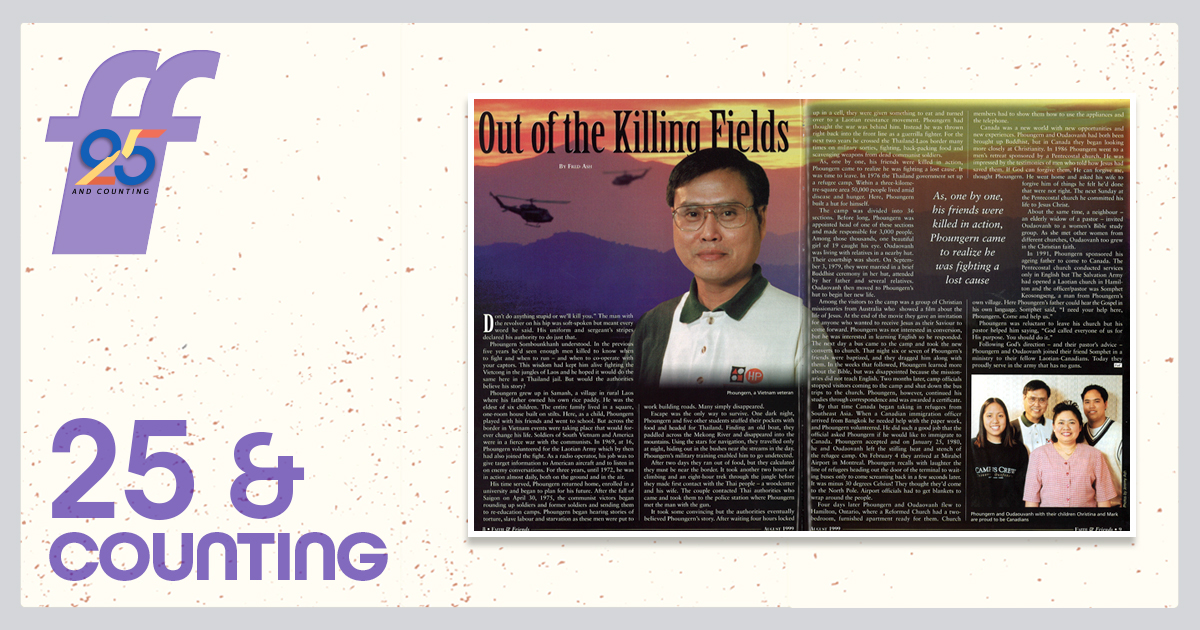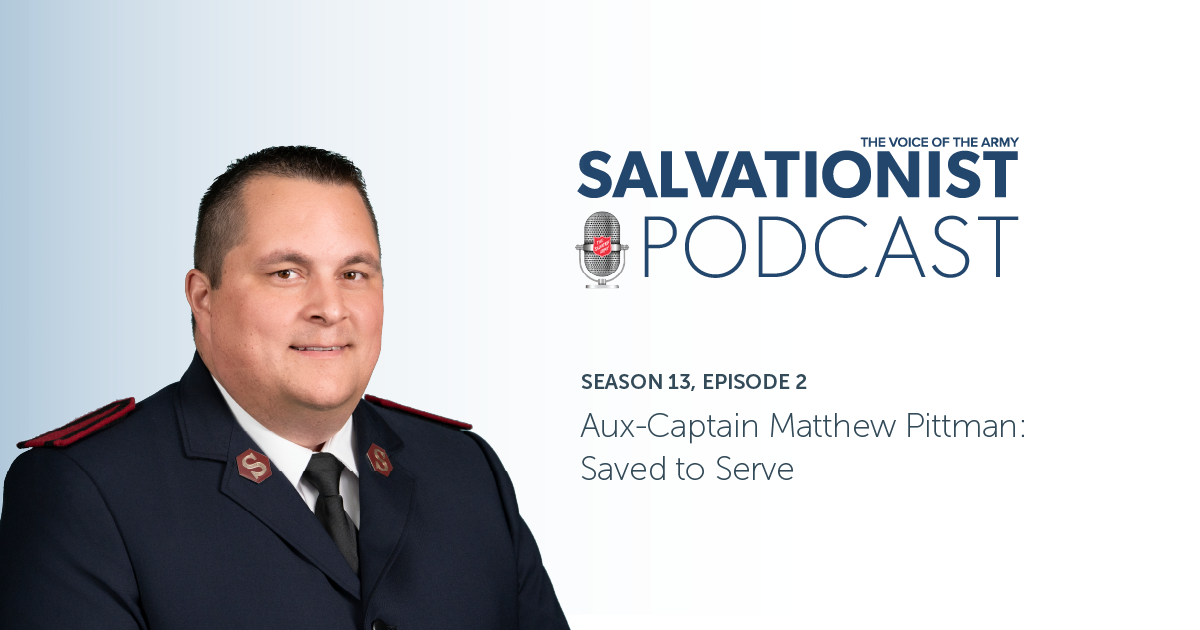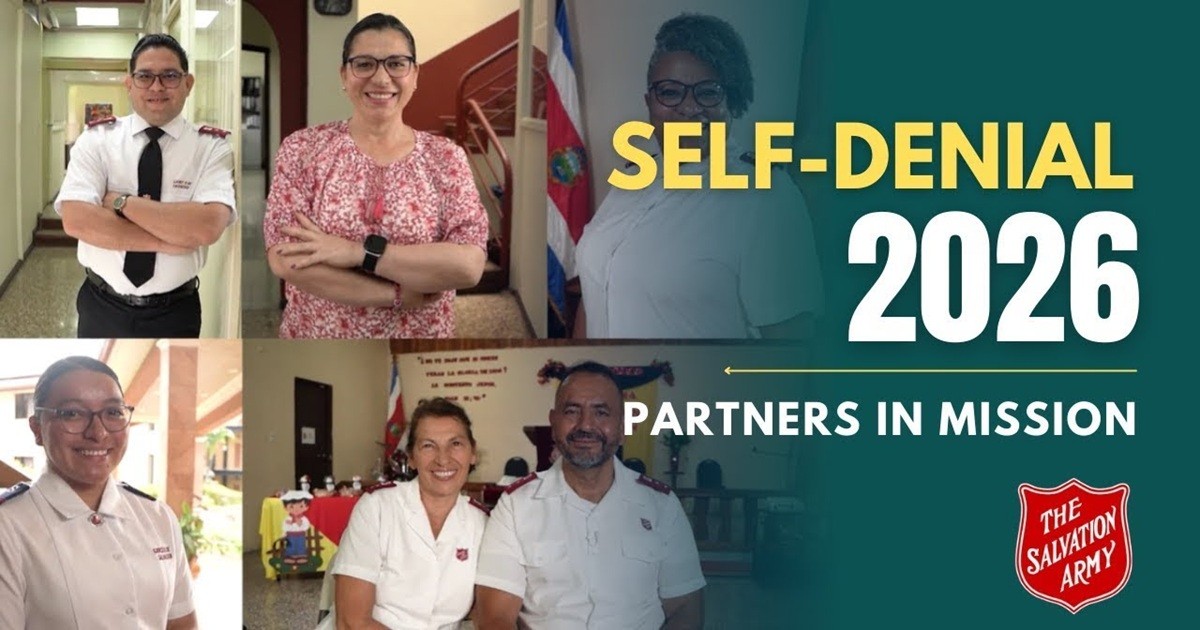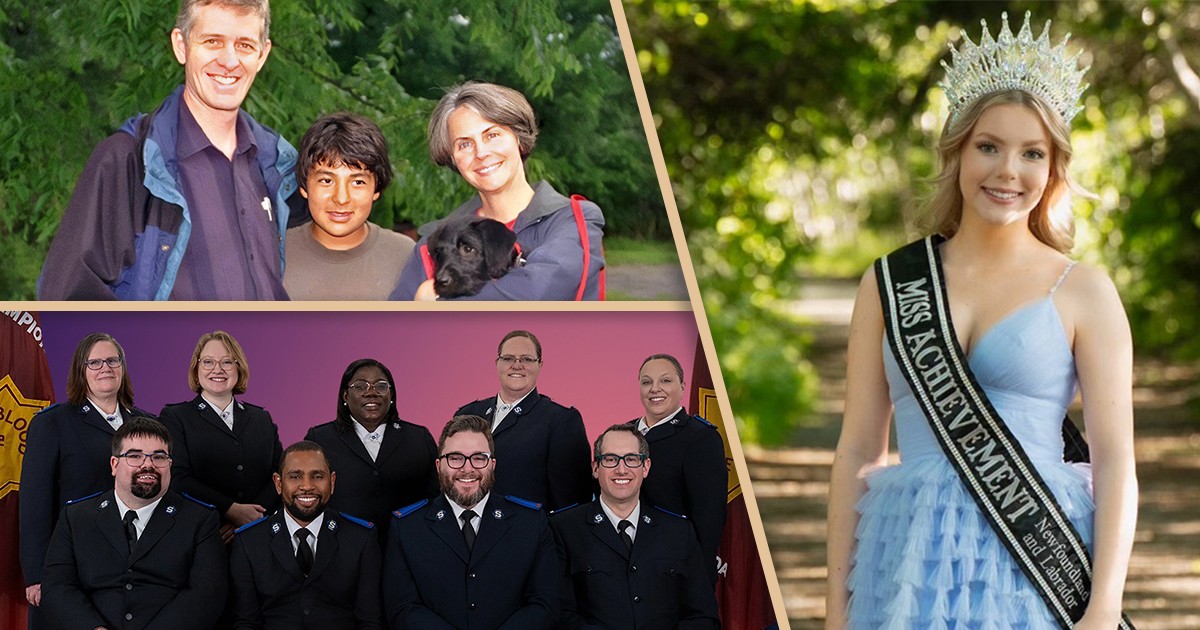To mark the 25th anniversary of Faith & Friends, we’ve been asking past editors, current writers and YOU, our readers, to tell us what articles have impacted them. If any article has spoken to you or changed how you thought of life and faith, we want to hear about it. Write, post a comment to Salvationist.ca, or email us. Our article this month was suggested by the very first editor of Faith & Friends, Fred Ash:
“One of the most impactful stories that I encountered in the first year of Faith & Friends was ‘Out of the Killing Fields’ (August 1999), that of Salvation Army Captain Phoungern Sombounkhanh and his wife Captain Oudaovanh. When I first met them, they were in charge of the Laotian Corps in Hamilton, Ont. In the years following, we became friends.
“Two things about his story made an impact on me. First, I was amazed by how God worked through the circumstances in Phoungern’s life to bring him to Hamilton and to The Salvation Army. I re-learned the old lesson that God is in the details. He watches over us and is intimately involved in our lives. Second, I came to appreciate that God works through different cultures. God is not confined to the Western culture, but all nations and all peoples are His. There was I from Newfoundland and Labrador, and there was Phoungern from Laos, and we became friends. Different languages, different cultures, even different food, but we came to appreciate one another as brothers in the Lord.”
“Don’t do anything stupid or we’ll kill you.” The man with the revolver on his hip was soft-spoken but meant every word he said. His uniform and sergeant’s stripes declared his authority to do just that.
Phoungern Sombounkhanh understood. In the previous five years he’d seen enough men killed to know when to fight and when to run—and when to co-operate with your captors. This wisdom had kept him alive fighting the Viet Cong in the jungles of Laos and he hoped it would do the same here in a Thailand jail. But would the authorities believe his story?
Phoungern grew up in Samanh, a village in rural Laos where his father owned his own rice paddy. He was the eldest of six children. The entire family lived in a square, one-room house built on stilts. Here, as a child, Phoungern played with his friends and went to school. But across the border in Vietnam events were taking place that would forever change his life. Soldiers of South Vietnam and the United States were in a fierce war with the communists. In 1969, at 16, Phoungern volunteered for the Laotian Army, which by then had also joined the fight. As a radio operator, his job was to give target information to American aircraft and to listen in on enemy conversations. For three years, until 1972, he was in action almost daily, both on the ground and in the air.
His time served, Phoungern returned home, enrolled in a university and began to plan for his future. After the fall of Saigon on April 30, 1975, the communist victors began rounding up soldiers and former soldiers and sending them to re-education camps. Phoungern began hearing stories of torture, slave labour and starvation as these men were put to work building roads. Many simply disappeared.
Escape was the only way to survive. One dark night, Phoungern and five other students stuffed their pockets with food and headed for Thailand. Finding an old boat, they paddled across the Mekong River and disappeared into the mountains. Using the stars for navigation, they travelled only at night, hiding out in the bushes near the streams in the day. Phoungern’s military training enabled him to go undetected.
After two days they ran out of food, but they calculated they must be near the border. It took another two hours of climbing and an eight-hour trek through the jungle before they made first contact with the Thai people—a woodcutter and his wife. The couple contacted Thai authorities who came and took them to the police station where Phoungern met the man with the gun.
It took some convincing but the authorities eventually believed Phoungern’s story. After waiting four hours locked up in a cell, they were given something to eat and turned over to a Laotian resistance movement. Phoungern had thought the war was behind him. Instead he was thrown right back into the front line as a guerrilla fighter. For the next two years he crossed the Thailand-Laos border many times on military sorties, fighting, backpacking food and scavenging weapons from dead communist soldiers.
As, one by one, his friends were killed in action, Phoungern came to realize he was fighting a lost cause. It was time to leave. In 1976 the Thailand government set up a refugee camp. Within a three-kilometre-square area 50,000 people lived amid disease and hunger. Here, Phoungern built a hut for himself.
The camp was divided into 36 sections. Before long, Phoungern was appointed head of one of these sections and made responsible for 3,000 people. Among those thousands, one beautiful girl of 19 caught his eye. Oudaovanh was living with relatives in a nearby hut. Their courtship was short. On September 3, 1979 they were married in a brief Buddhist ceremony in her hut, attended by her father and several relatives. Oudaovanh then moved to Phoungern’s hut to begin her new life.
Among the visitors to the camp was a group of Christian missionaries from Australia who showed a film about the life of Jesus. At the end of the movie they gave an invitation for anyone who wanted to receive Jesus as their Saviour to come forward. Phoungern was not interested in conversion, but he was interested in learning English so he responded. The next day a bus came to the camp and took the new converts to church. That night six or seven of Phoungern’s friends were baptized, and they dragged him along with them. In the weeks that followed, Phoungern learned more about the Bible, but was disappointed because the missionaries did not teach English. Two months later, camp officials stopped visitors coming to the camp and shut down the bus trips to the church. Phoungern, however, continued his studies through correspondence and was awarded a certificate.
By that time Canada began taking in refugees from Southeast Asia. When a Canadian immigration officer arrived from Bangkok he needed help with the paper work, and Phoungern volunteered. He did such a good job that the official asked Phoungern if he would like to immigrate to Canada. Phoungern accepted and on January 25, 1980, he and Oudaovanh left the stifling heat and stench of the refugee camp. On February 4 they arrived at Mirabel Airport in Montreal. Phoungern recalls with laughter the line of refugees heading out the door of the terminal to waiting buses only to come screaming back in a few seconds later. It was minus 30 degrees Celsius! They thought they’d come to the North Pole. Airport officials had to get blankets to wrap around the people.
Four days later Phoungern and Oudaovanh flew to Hamilton, Ontario, where a Reformed Church had a two-bedroom, furnished apartment ready for them. Church members had to show them how to use the appliances and the telephone.
Canada was a new world with new opportunities and new experiences. Phoungern and Oudaovanh had both been brought up Buddhist, but in Canada they began looking more closely at Christianity. In 1986 Phoungern went to a men’s retreat sponsored by a Pentecostal church. He was impressed by the testimonies of men who told how Jesus had saved them. If God can forgive them, He can forgive me, thought Phoungern. He went home and asked his wife to forgive him of things he felt he’d done that were not right. The next Sunday at the Pentecostal church he committed his life to Jesus Christ.
About the same time, a neighbour—an elderly widow of a pastor—invited Oudaovanh to a women’s Bible study group. As she met other women from different churches, Oudaovanh, too, grew in the Christian faith.
In 1991, Phoungern sponsored his ageing father to come to Canada. The Pentecostal church conducted services only in English but The Salvation Army had opened a Laotian church in Hamilton and the officer/pastor was Somphet Keosongseng, a man from Phoungern’s own village. Here Phoungern’s father could hear the gospel in his own language. Somphet said, “I need your help here, Phoungern. Come and help us.”
Phoungern was reluctant to leave his church but his pastor helped him saying, “God called every one of us for His purpose. You should do it.”
Following God’s direction—and their pastor’s advice—Phoungern and Oudaovanh joined their friend Somphet in a ministry to their fellow Laotian-Canadians. Today they proudly serve in the army that has no guns.










Leave a Comment